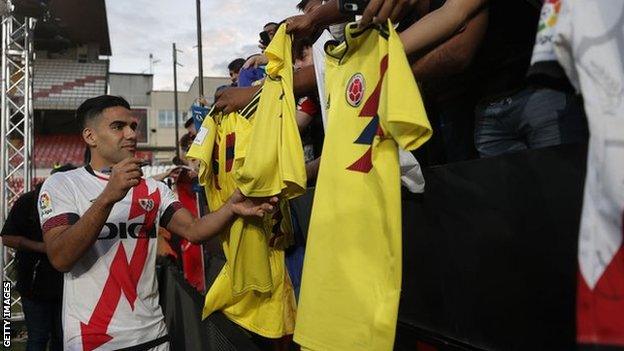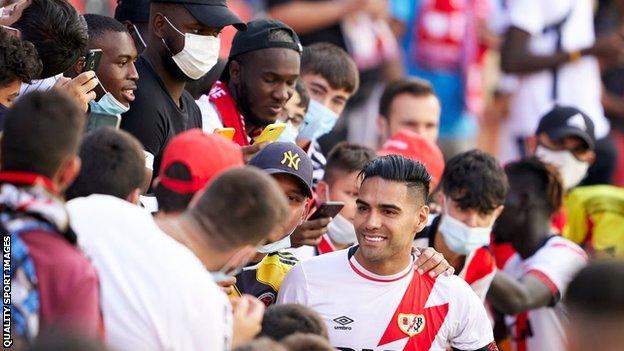Radamel Falcao: Why one of La Liga's most prolific goalscorers is a Madrid hero once more
- Published

Radamel Falcao signed for Rayo Vallecano in the summer
When Barcelona attempt to revive their already flagging title ambitions on Wednesday night, they will be confronted by La Liga's most prolific marksman this century outside the 'big two'.
Radamel Falcao is back in Spain after joining Rayo Vallecano and, with 55 goals in 73 games, the Colombian has a better goals-per-game career record (0.76) than anyone other than Cristiano Ronaldo (1.07) and Lionel Messi (0.91) in La Liga history.
Most of those came during two brilliant years at Atletico Madrid, between 2011 and 2013, when Falcao established himself as one of the game's hottest properties.
Although injuries derailed subsequent spells with Monaco, Manchester United and Chelsea, the past couple of years saw Falcao regain form and fitness with two successful seasons at Galatasaray, bagging 20 goals in 43 appearances.
Now, a decade later, Falcao has returned to the country - and the city - that propelled him to global superstardom. And although, at the age of 35, he's no longer the unstoppable force of nature seen in his peak years, he has proved to be a hugely significant signing both on and off the pitch.
Rayo's shock swoop just before the transfer window closed prompted hysteria among fans who are not accustomed to cheering on such globally renowned talents - Falcao's only rival for the status of Rayo's most famous player ever is Mexican striker Hugo Sanchez in the 1990s.
Handily, Falcao immediately lived up to the hype, netting a typically thunderous debut strike just 10 minutes after coming off the bench to seal a 3-0 win over neighbouring Getafe.
He followed that up with an injury-time winner in Bilbao to defeat Athletic Club 2-1, before marking his first start with his third goal in three games to help defeat Cadiz 3-1.

Falcao scored against Getafe on his Rayo Vallecano debut
Those strikes not only reannounced Falcao as a potent goalscorer, but also played a major part in establishing Rayo as this season's surprise package after their promotion through the play-offs in June.
Heading into Wednesday's meeting with Barca, they are placed seventh in the table - higher than the visitors - largely on the back of a 100% home record.
In addition to the Falcao factor, Rayo have gained admirers thanks to their open, attack-minded playing style masterminded by boss Andoni Iraola, who is rapidly becoming Spain's hottest young coaching prospect after a playing career including more than 500 appearances for Athletic Club.
In fact, that widespread admiration for Rayo was already largely in place, because they are seen as a uniquely appealing club which makes them the 'second team' for many fans across Spain.
Located in the streets of Vallecas, one of Madrid's poorer suburbs and the name of Rayo's stadium, the club has stubbornly fought off modernity to retain a strong sense of identity far removed from the glitz and glamour of Real Madrid in the smart Chamartin district to the north of the city centre.
Robbie Dunne wrote a book on Rayo with the self-explanatory title 'Working Class Heroes', and he told BBC Sport: "Vallecas is working class to the core, and Rayo is the last of the neighbourhood teams. There is an authentic feeling to everything, from the guys serving beer to the fans on the streets and the vendors inside the stadium."
A significant part of that 'authentic feeling' derives from a strong Latino influence. More than 400,000 South Americans live in Madrid, including 60,000 Colombians. Many of them have found their new homes in cheap-rent districts such as Vallecas, which goes a long way towards explaining why Falcao is not an ordinary signing at an ordinary club.
A national hero unexpectedly turning up on their doorsteps means more than just success on the football field for Rayo fans. It is also a matter of pride and identity, and the adulation Falcao receives was illustrated when the club sold out of his replica shirts last week.
"Rayo are the closest thing you'll get to the pure passion of South American football where mavericks and a certain amount of unpredictability still reign supreme," says Dunne, underlining why Falcao is such a perfect fit at his new club.
Not everything is rosy, though. Another of Spanish football's 'mavericks' is Rayo's president Raul Martin Presa, who has infuriated many fans over the 11 years of his leadership by - as they see it - failing to improve the stadium facilities and generally treating them as an irritating afterthought.
"He invited right-wing politicians into the directors' box at a game last season," adds Dunne. "He did so when there were no fans to protest against it, and it was seen as an act of hostility against a proud working-class neighbourhood."
The distaste felt by many fans towards their president commingling with non-negotiable passion for their team is just one of the quirks which makes Rayo such an enigmatic club, and the addition of Radamel Falcao provides another reason to follow their fascinating journey this season.

Our coverage of your Premier League club is bigger and better than ever before - follow your team and sign up for notifications in the BBC Sport app to make sure you never miss a moment
